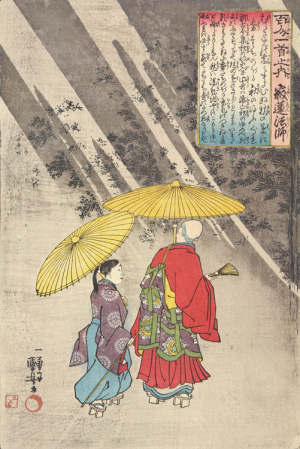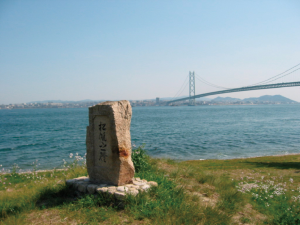(Boylove Documentary Sourcebook) - The Tragic Pederastic Medieval Japanese Buddhist Clerical Love Story of "The Tale of Matsuho Bay", as Recorded in Its Synopsis from 'Wild Azaleas', Compiled by Kitamura Kigin

From "The Invention of a Literary Tradition of Male Love: Kitamura Kigin's Iwatsutsuji" by Paul Gordon Schalow, in Monumenta Nipponica, Vol. 48, No. 1 (Spring 1993). Footnotes omitted.
Note 1: Wild Azaleas (岩津々志 Iwatsutsuji, 1676) is a Japanese anthology of 34 homoerotic poems and prose passages, gathered by Kitamura Kigin from 16 classical works of literature.[1]
Note 2: "The Tale of Matsuho Bay" (松帆浦物語 Matsuho no Ura Monogatari) is an anonymous Japanese short story written before 1510, belonging to the homoerotic literary genre of "acolyte tales".[2]
Note 3: In premodern times Japan followed the East Asian age reckoning, by which people are born at the age of one, i.e. the first year of lifetime using an ordinal numeral (instead of "zero" using a cardinal numeral), and on Chinese New Year or New Year's Day one year is added to their age. Since age is incremented at the beginning of the lunar or solar year, rather than on the anniversary of a birthday, people may be one or two years older in Asian reckoning than in the international age system.[3]
Synopsis of Matsuho Monogatari.
A courtier’s son named Jijū, aged fourteen or fifteen, was refined and full of love. A priest, Saishō of Iwakura, made a secret vow of love with him, and three years passed. At that time, the Prime Minister’s son, Captain Taishō, heard about Jijū and sent him a love letter. Jijū explained that he was ill and did not go as summoned. It was the time of rains in the Fifth Month, so the captain wrote:
|
hototogisu |
|
The nightingale |
‘When you are feeling a little better, please come.’
But Jijū responded with this poem:
|
samidare no |
|
Even if there were clear spells |
Taishō heard that Jijū had rejected his love because of Saishō and became angry. In the end, he exiled Saishō to Matsuho Bay on Awaji Island. Captain Taishō then arranged with Jijū's elder brother, Chūjō, to have Jijū brought to him. He tried his best to win the boy’s love, but Jijū despised the captain’s intentions. Not even the beautiful mansion where he was held could sway the boy’s heart. All Jijū could think of was Saishō suffering poverty in a crude hut, innocent of any wrong-doing, and this grieved him deeply. Jijū escaped in secret and, accompanied by a priest named Tosa who had stayed to guard Saishō’s house, made his way to Matsuho Bay.
At Suma Jijū recalled the autumn wind of myriad emotions that buffeted the Shining Prince, Genji, and composed this grief-filled poem:
|
akikaze ni |
|
The autumn wind |
Jijū boarded a boat and crossed to Awaji. This was the bay about which Kyōgoku Chūnagon had composed the verse, ‘How it burns—the saltmaker’s seaweed,’ and Jijū’s heart burned similarly as he searched everywhere for Saishō. He came to a small hut where an old priest warmed himself all alone by a meager fire of pine needles. Jijū approached and asked if he knew where Saishō was, and the Zen priest indicated that he knew him.
‘He was a frequent visitor here and always spoke of the young courtier he had loved and left behind in the capital. He grieved for him from morning to night and finally died of heartbreak, exactly seven days ago. He told me to convey this letter if I heard from the young man.’
Jijū looked at the letter and found that it contained many matters, including a poem:
|
kuyashiki wa |
|
I regret but this: |
His writing looked like the faint tracings of bird tracks. When Jijū realized that these were truly Saishō’s last words, he was overwhelmed with grief. In tears, he went to Saishō’s grave to pray. He planted a pine over it and attached this poem:
|
okureji no |
|
Unaware of my determination |
He then tried to throw himself into the sea, but Tosa finally succeeded in preventing him and he had no choice but to go on living. They say that he ultimately received the tonsure and entered a temple on Mt Kōya.

References
- ↑ Paul Gordon Schalow, "The Invention of a Literary Tradition of Male Love: Kitamura Kigin's Iwatsutsuji", in Monumenta Nipponica, Vol. 48, No. 1 (Spring 1993), pp. 1–2.
- ↑ Paul Gordon Schalow, "The Invention of a Literary Tradition of Male Love: Kitamura Kigin's Iwatsutsuji", in Monumenta Nipponica, Vol. 48, No. 1 (Spring 1993), p. 29.
- ↑ https://en.wikipedia.org/wiki/East_Asian_age_reckoning
See also
- Adult friend (dictionary)
- Age of attraction (dictionary)
- Bishōnen
- Boylove
- Ephebophilia
- Historical boylove relationships in Japan
- Loved boy (dictionary)
- Manga and anime
- Minor-attracted person (dictionary)
- Nenja
- Pederasty
- Pedophilia
- Samurai
- Shōnen
- Shudō
- The Great Mirror of Male Love (book)
- Wakashū
- Young friend (dictionary)